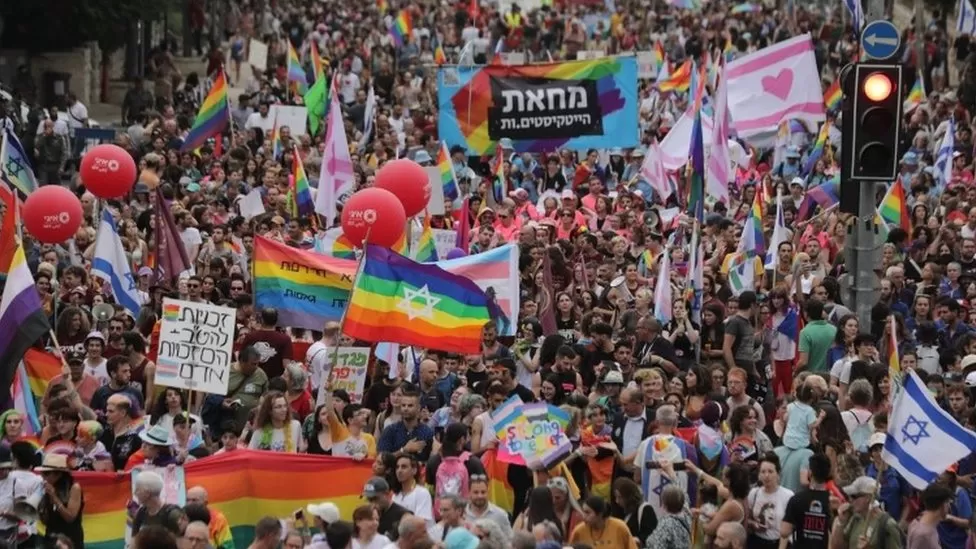In the bustling city of Jerusalem, the annual Gay Pride march recently took place, drawing thousands of resilient individuals who refused to be silenced by security concerns and opposition from a far-right minister. Despite the backdrop of online threats and counter-protests, the LGBTQ community and its allies waved vibrant rainbow and Israeli flags, proudly asserting their presence and accusing far-right ministers of attempting to stifle their identity.
The atmosphere surrounding the event shed light on the deepening divide within Israeli society. While secular Jews have long championed the country’s open culture of LGBTQ rights, political and demographic shifts have granted unprecedented power to nationalist and ultra-Orthodox right-wing factions. This schism is acutely felt in Jerusalem, known for its conservative and religious populations, where clashes between progressive ideals and traditional beliefs occur with increasing frequency.
One prominent figure at the center of controversy during the march was Itamar Ben-Gvir, the far-right Police Minister. Irony engulfed the event as the minister, responsible for ensuring the march’s security, was met with jeers and condemnation from the very crowd he was tasked to protect. Mr. Ben-Gvir has a well-documented history of aggressively espousing homophobic views, including participating in a so-called “beast parade” that rejected LGBTQ rights. His presence, coupled with the election of a hardline religious-nationalist government, added fuel to an already incendiary situation.


As tensions escalated, threats and hate speech proliferated online, highlighting the urgent need for enhanced security measures. Three individuals were arrested for making threats prior to the event, and online watchdog organization FakeReporter reported a surge in homophobic hate speech circulating within far-right Telegram and WhatsApp groups. Lehava, a far-right group, referred to the march as the “abomination parade” and called for protests, issuing chilling messages that ominously declared it would be a “deadly Thursday.”
To ensure the safety of the participants, the event was cordoned off with protective barricades, and hundreds of armed police patrolled the designated route. Organizers, acutely aware of the prevailing climate of danger, cautioned about the risks faced by LGBTQ individuals and underscored the importance of their visibility and solidarity. This call resonated deeply, resulting in a record attendance of 30,000 people who defiantly stood together against discrimination and intolerance.
The clash between progressive values and a shifting political landscape has magnified the fault lines within Israeli society. Prime Minister Benjamin Netanyahu, facing widespread accusations of eroding LGBTQ rights, sought to distance himself from the opposition by tweeting during the event, expressing pride in Israel’s reputation as one of the world’s most accepting and inclusive countries for the gay community. Yet, the concerns of marchers remained palpable, as they voiced worries about the current coalition government, which they perceived as the most homophobic and transphobic in recent memory.
In this charged atmosphere, marchers showcased resilience and determination, refusing to allow political dynamics to dampen their spirits. Elisa Gilman, a Gay Pride marcher, extended free hugs to younger participants who had longed for parental affection denied due to their sexuality. Gilman emphasized that the government’s actions should not dictate one’s identity or sense of self. Amidst the adversity, marcher Yuval declared, “We’re here today to say that we are here to stay and that we will not give up.”
Itamar Ben-Gvir’s presence at the event symbolized the ongoing struggle between acceptance and discrimination. Although he distanced himself from his past involvement in the beast parade and proclaimed LGBTQ individuals as his “brothers and sisters,” skepticism loomed over his true intentions. The clash of ideals in Jerusalem not only represents a localized conflict but also mirrors the broader battle for LGBTQ rights in a world grappling with societal shifts and the rise of conservative ideologies.
As the Jerusalem Gay Pride march came to a close, the deeply divided Israeli society was left to grapple with the ramifications of the event. The struggle for equal rights and acceptance continues to challenge the nation, highlighting the resilience and determination of the LGBTQ community and their allies who strive for a more inclusive and accepting future.

